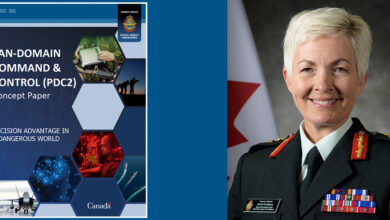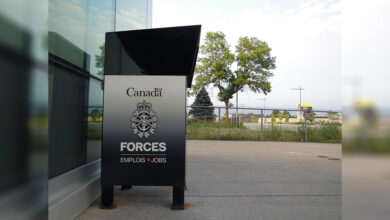Policy
CF Delayed Pension Class Action receives approval
The Federal Court certified a class proceeding on April 16, 2021, that will address delayed payment of Canadian Forces Superannuation Act pension benefits between 2007 and 2017.
Canadian Armed Forces (CAF) members who served time in the Reserve Force, and released from the CAF between 2007 and 2017, could be Class members. Individuals of the Class may be entitled to a payment if the class proceeding succeeds at trial or is settled.
According to a press release, this class action seeks damages for delays in the processing of immediate pension entitlements owed to veterans discharged from the Canadian Armed Forces.
“The class action is against the Attorney General of Canada and alleges, among other things, that Canada has engaged in chronic, excessive and unreasonable delay in the payment of pensions to discharged members of the Canadian Armed Forces,” the press release informed.

WHO ARE THE CLASS MEMBERS?
The CAF member who acts as representative plaintiff on behalf of the Class is Douglas Jost.
As stated in a press release, the Federal Court has defined the Class as all individuals who:
-
-
- served in the Canadian Armed Forces – Reserve Force;
- released from the Canadian Armed Forces between March 1, 2007, and October 31, 2017;
- were entitled to receive an Immediate Annuity, Transfer Value, Annual Allowance and/or Bridge Benefit under the Regular Force Pension Plan or the Reserve Force Pension Plan; and
- did not receive payment of the Immediate Annuity, Transfer Value, Annual Allowance, and/or Bridge Benefit for more than 60 days from the date of release.
-
Class members don’t have to do anything to participate, and individuals won’t be automatically included in the proceeding and bound by the results unless they opt-out, according to the press release.
Adam Tanel, lawyer, Koskie Minsky LLP, said, “The most important thing is to identify yourselves. In class actions, often times, there is money that goes unclaimed that people are entitled to receive in terms of benefits through a class action settlement or a class action decision, but they don’t come forward and claim the benefit.”
Tanel continued and said it’s important to reach out and contact the communications department at Koskie Minsky LLP in the Class Actions tab. When money becomes available, if they have an email address for the member of the Class, an e-blast will go out, and they’ll get it. This is to try and help make sure that everybody who’s entitled to compensation receives it.
If the case is unsuccessful, there will be no legal fees. If the case succeeds, whether at trial or by settlement, the Federal Court must approve Class Counsel’s fees and any settlement of the class proceeding.
If anyone wishes to opt-out, they need to sign and deliver an Opt-Out Coupon available from the lawyers for the Class (Class Counsel), Koskie Minsky LLP, Toronto, no later than August 14, 2021.
BACKGROUND
When the Reserve Force Pension Plan came into effect in 2007, Reserve Force members were required to contribute to the plan. They could also elect to buy back past service.
The Defendant is responsible for both the Regular Force Plan and the Reserve Force Plan. Some pension entitlements are payable immediately upon release. These entitlements are Immediate Annuities, Transfer Values, Annual Allowances, and Bridge Benefits.
Adam Tanel noted that the pension program for reservists was a good thing to provide men and women of the Canadian Armed Forces (CAF) with a pension. However, he said that the problem came when reservists retired and went to access their pensions. He also explained that “once members released, they found themselves dealing with the pension administration system for months trying to get straight answers and trying to get the money they were owed.”
Since the Reserve Plan was first introduced, the Reserve Plan and the Regular Plan have had various issues with massive delays in processing Immediate Pension Entitlements, according to a document from Tanel.
In 2011, Canada’s Chief of Military Personnel, Rear Admiral Smith, acknowledged that the system put in place by the Defendant was “not adequately designed to deal with the unique part-time cases of reservists.”
The document informed that in 2011, the Auditor General released its report on the findings from its audit on the Reserve Plan, encompassing a review of financial statements from 2007 to 2010. The Auditor General concluded that the Reserve Plan was introduced without proper planning.
The document stated the Ombudsman noted in 2014: “Disappointingly, and despite our numerous efforts to raise and discuss these concerns with the Department (of National Defence), the backlog and chronic, excessive delays in paying Reservists their entitlements persist. This is both unfair and unacceptable.”
The backlog continued until pension administration was transferred to Public Services and Procurement Canada (PSPC) in July 2016. The Defendant acknowledges that at the time of the transfer, the backlog was 13,549 cases.
ABOUT KOSKIE MINSKY LLP
Koskie Minsky LLP stated that they’re one of the reading class action firms in the country. They handle all different types of class actions.
“Unfortunately, we have numerous actions as a result of veterans being short changed. I’d say unfortunately not because I don’t like doing the work, but because it’s unfortunate to me that this keeps happening to people who have served the country,” stated Tanel.
Tanel explained that an individual in 2017, who is retired, suffered concerning these unacceptable delays and was ready and willing and able to do something about it, retained Koskie Minsky LLP for this class action.
For more information visit Koskie Minsky LPP website here.


















